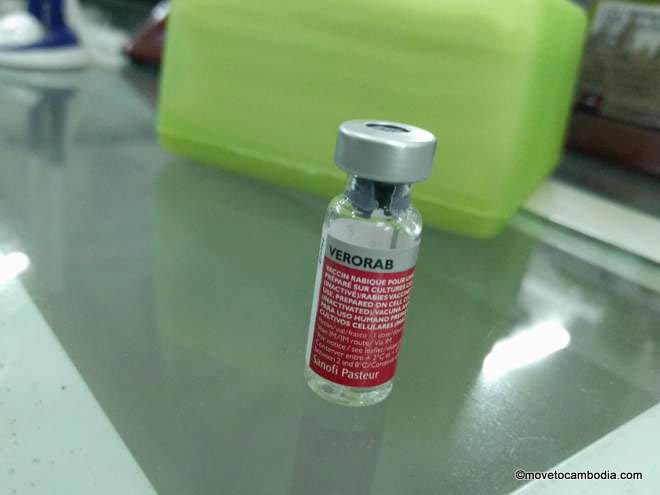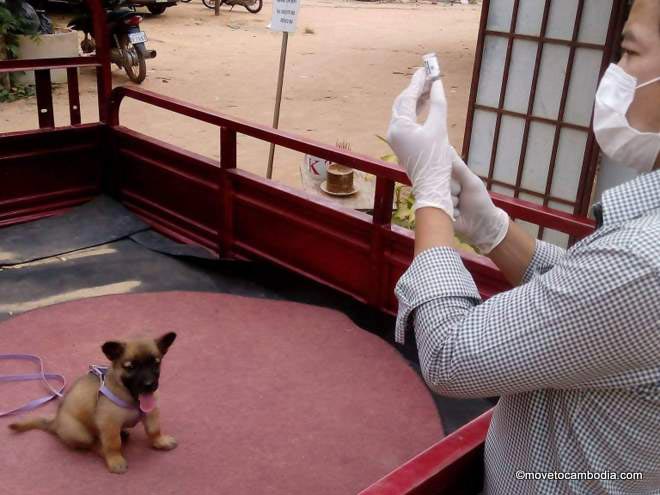Recently I was bitten by a dog in Siem Reap. It was a dog who was known to me, a dog I had pet with no issue a few days before, and a dog I was fairly certain had received at least one rabies vaccination a couple of years earlier. But the bite broke the skin, there was a little bit of blood, and I was yet again faced with the question, do I really need to get more rabies shots?

Don’t pet strange dogs, even if they are adorable.
This is a question that many people living in and visiting Cambodia have. The hassle of getting a series of rabies shots can seem onerous, and the risk miniscule. But after talking to friends and a few friendly doctors, I quickly came to realize that rabies is one of the few illnesses that you don’t want to mess around with.
Although Cambodia has committed to eradicating rabies by 2030 (an extremely ambitious and probably unattainable goal) it is still a high-rabies country where the disease is prevalent. This is why you need to get treatment if you get bitten, even by a dog that is known to you, and even if it’s just a scratch. Although this post focuses on dogs, you can also get rabies from any mammal, including cats, monkeys, and bats.
I went from being quite cavalier about my little bite to being a frightened doomsayer after reading about the death of a 23-year-old French expat who was bitten while feeding a stray dog in Kep. She went to a doctor in Kampot who cleaned the wound and gave her an injection (it is unknown what he gave her, but it is believed to have been a tetanus injection). She returned to the doctor a month later for wound care, and he again cleaned it and sent her home. A few days later she started showing symptoms of rabies: diarrhea, vomiting, difficulty swallowing, high fever, hypersalivation and what is known as hydrophobia. A day later she was dead.
Rabies is 100% fatal once you start showing symptoms, at which point treatment is not possible. What is so sad about the young woman in Kep is she did seek treatment, and had she been given the post-exposure rabies injections she would be alive today. This may be one of the few stories of foreigners getting rabies, but Cambodians die of rabies every year. Children are particularly susceptible, probably because they are more likely to get bitten by dogs.

Getting the rabies vaccination.
Dr. Nick Walsh, MD PhD and public health expert, says “Rabies is potentially fatal, and treatment is limited, so vaccination is strongly recommended where rabies is present in the animal (dogs, bats, monkey) population.”
So what can you do? Nick advises that if you aren’t vaccinated and get bit or otherwise exposed, you should:
- Clean the wound thoroughly with antiseptic, e.g. iodine
- Get an immediate rabies immunoglobulin infiltration around the wound site
- Follow the full vaccination schedule, with the first within 24 hours, and the following at 3, 7, and 14 days
If you have already been vaccinated when you’re exposed:
- Clean the wound thoroughly with antiseptic e.g. iodine
- Get two does of the vaccination, the first within 24 hours and the next at 3 days after exposure
You can read more about it on the CDC and WHO sites.

Please get your dogs vaccinated for rabies and keep them up to date on their shots.
Anything else?
Get pre-exposure vaccinations. You can do this before you come to Cambodia (the series costs $34 at the Pasteur Institut, or once you arrive. Get a booster if you’ve had your pre-exposure shots more than 3-5 years ago. You can get a titre test to check your antibody level — some people only need boosters every 10 years.
Don’t pet stray dogs and be wary of dogs that aren’t stray but spend a lot of time on the street. They’re more likely to have been exposed to rabies, and most have had bad experiences with people and thus are more likely to bite.
If you have a dog in Cambodia, make sure they are up-to-date with their rabies vaccinations.

In and out for post-exposures rabies shots at the Pasteur Institut. in Phnom Penh
Where to get rabies vaccinations in Cambodia
Phnom Penh’s Pasteur Institute is the gold standard. Only $15 total for both shots, the clinic is efficient and best of, reliable. You can be certain they aren’t giving you vaccinations that are expired or haven’t been kept at the right temperature. You can walk-in between 8 and 10 a.m., and the earlier you arrive the more quickly you will be treated.
Dr. Gavin Scott, a British physician, also offers pre- and post-exposure rabies vaccinations in Phnom Penh. The cost is $65 each, and he’s also available to talk to you about other tropical diseases or STIs.
I also called Phnom Penh Royal Hospital, just for a laugh. This hospital’s pricing is designed to take advantage of people’s insurance policies, and is to be avoided if you are paying yourself. We were quoted $300 for a series of rabies injections, plus you’re required to see a doctor first that costs an additional $200.
In Sihanoukville, I have gotten post-exposure vaccinations at CT Clinic, where they charge $45 per injection (although the price has probably gone up since then).
In Siem Reap, I have gotten post-exposure vaccinations at Neak Tep Clinic, who charge $45 per injection. They are another reliable clinic that is popular with locals and expats.
A friend recently called around the clinics in Siem Reap and said that Prasat Keo on Wat Bo, was the least expensive in town, at $20 per shot.
In Kampot, Sonja Kill Hospital allegedly offers rabies vaccinations, but when I called they weren’t sure if they had any, and weren’t certain of the price.
Please do not take this post as medical advice. I am not a medical professional! If you get bitten or otherwise worry you have been exposed to rabies, please see a doctor immediately.
Got my first of 4 shots at $35 each within 1 hour of a dog bite, so I hope I am okay. 3 tiny puncture wounds from grabbing the dog by the upper snout, rendering him helpless, and his teeth were dull.
I found your article really useful thank you. We are travelling to Cambodia as a family of 4 and I would love to get the pre travel vaccinations but it amounts to nearly £1000 in the UK! Does anyone know the difference in treatment path for vaccinated v non vaccinated and is RIG readily available in Siem Reap? Many thanks
If you’re going to Phnom Penh, you could get the pre-exposure rabies vaccine at Pasteur Clinic. Or if you’re only going to be in Siem Reap contact Neak Tep and you can get more specific details about what they offer and the price. All of of the pre-travel vaccinations will be cheaper in Cambodia, and some might be worth getting if you travel regularly even if they won’t kick in immediately.
My rabies injection experiences happened somewhere in 2018, after I was out of nothing bitten from behind, in my lower right leg, by a stray dog at a temple in Kratie. Being far from the big city, I did get on my motorbike and got back to Phnom Penh within 48 hours and drove straight to the Royal Hospital. I was charged a low price for the horse serum and a high price for the human serum. I needed at least 5 injections deep into the wounds, so make that 5x $500. My insurance back home paid, so indeed I hardly cared. I do remember screaming up that entire emergency ward when these needles went in. I had my entire bingo card full of tropical disease experiences, but this one was the most painful experience ever.
Lina, I just moved back to Phnom Penh and this is not a rabies question, but, we used to go to Flicks to see new American movies and see it’s closed. Are there any other small theaters that show movies, other than what is playing at the big cinemas? thanks so much, Ken Liss
As the former owner of The Flicks I can confirm there is none, but the big cineplexes might still show the blockbusters only. After running the Flicks for over 10 years, I wanted out and covid and the entire exodus of tourists and local expats made that absolutely necessary. I would be hard to have survived the last three years, honestly.
I have also heard that the major distributor in Cambodia was going after anybody who was pretending to be a small movie theater and fined bars and hostels that even showed The Killing Fields movie on their televisions, as the distributor owns the rights with Sony Pictures. I wouldn’t even start a movie theater for the foreigners in town for already that reason.
This is such an excellent article, and yes, I also recommend Prasat Keo on Wat Bo Road for those seeking the rabies vaccinations in Siem Reap.
I would also note that many Cambodian doctors still believe that only dogs transmit rabies. The Khmer term for the disease, after all, is chgai chguit (please forgive the bad transliteration, but it means crazy dog disease). A friend went to the nearest clinic after a monkey bit her, and the doc there insisted there was no risk of rabies. We need to remember that all mammals can transmit rabies and find doctors who will respond accordingly.
Thanks for this reminder, Amanda. I’ve just updated the article to mention monkeys, bats, and cats, with a link to other animals that can carry rabies (all mammals, actually!)
Can you get pre-exposure vaccinations?
Yes